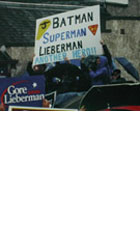
Only in America 2003
Distributed by Seventh Art Releasing, 7551 Sunset Blvd., Suite 104, Los Angeles, CA 90046; 323-845-1455
Produced by Ann Benjamin &Ron Frank; 24/6 Productions
Directed by Ron Frank
VHS, color, 72 min.
Sr. High - Adult
Jewish Studies, American Studies, Biography
Date Entered: 11/09/2018
Reviewed by Sheila Intner, Professor, Graduate School of Library & Information Science, Simmons College GSLIS at Mt. Holyoke, South Hadley, MAIn the final scene of this film, Senator Joe Lieberman of Connecticut declares his candidacy for President of the United States in 2004. Could the intent of this film be to promote his candidacy? If so, it would not be an appropriate addition to academic library collections. But, once the 2004 election ends, that agenda, if it was the producers' true intention, is done, and new questions can be asked: what does this film portray and how might it be perceived and used? This reviewer believes that any political agenda for this film is of such limited duration as to be irrelevant. Instead, she tries to evaluate the film's utility in post-election terms.
Joe Lieberman is a decent man. Whether or not you voted for him as Al Gore's Vice-Presidential running mate, agree with his positions on issues, or believe he was the right choice for the 2000 Democratic Party national ticket, what comes through in this film is the genuine honesty and goodness of the man as a human being. It does not matter that he is Jewish, although Jewishness defines the film, examining Lieberman as a Jewish candidate. It does not matter that he is a politician, although the presidential election campaign, that most political of events, occupies all but a few minutes of running time. And it does not matter that he lost, because, as he, his wife Hadassah, and his mother Marsha, all say, just being chosen to run constituted greater success than he imagined in his wildest dreams. Lieberman's forthrightness, his love of country, faith in God, and appreciation of the good hand that Fate dealt him, are the attributes evident in his speeches, pronouncements, and opinions.
The film is a play-by-play view of Lieberman's run for Vice-President, from his selection by Al Gore, through the campaign itself, to the Supreme Court decision that signaled the Gore-Lieberman loss early in 2001. Most of the time, we see the candidate on the road in planes, trains, and buses, greeting audiences, and cheerfully explaining that "only in America" (no acknowledgement to Harry Golden) could someone from a humble Jewish background like his rise to be a candidate for Vice-President of the nation. The balance of the material includes numerous scenes of the Liebermans at home, celebrating the Sabbath, Joe chatting with his rabbi in Stamford's Orthodox Jewish synagogue, and walking home from the Capitol at night when Sabbath rules prohibit riding; and archival footage of Jewish immigrants at Ellis Island, Jews in various times and places during the 20th century, and historic American anti-Semites such as Henry Ford and Father Coughlin. Brief commentaries by people as different as comic Alan King, author Eli Evans, Rabbi Arthur Hertzberg, identified here as an historian, and others, are interspersed. In the end of the day, we come to believe that Joe Lieberman is glad to be a U.S. Senator even as he aspires to the presidency.
Recommended for collections supporting studies of U.S. politics, the 2000 presidential election, and Jews in America.